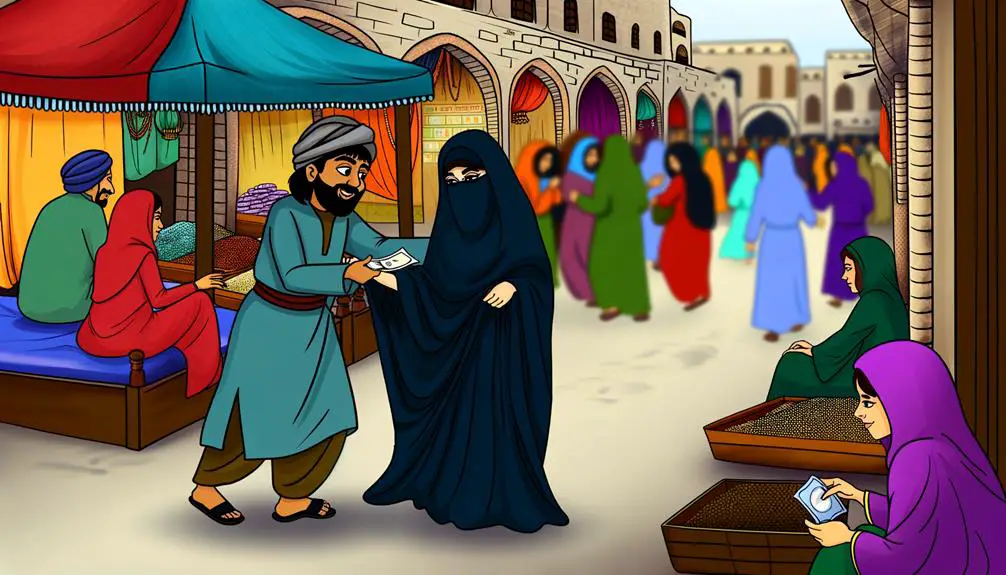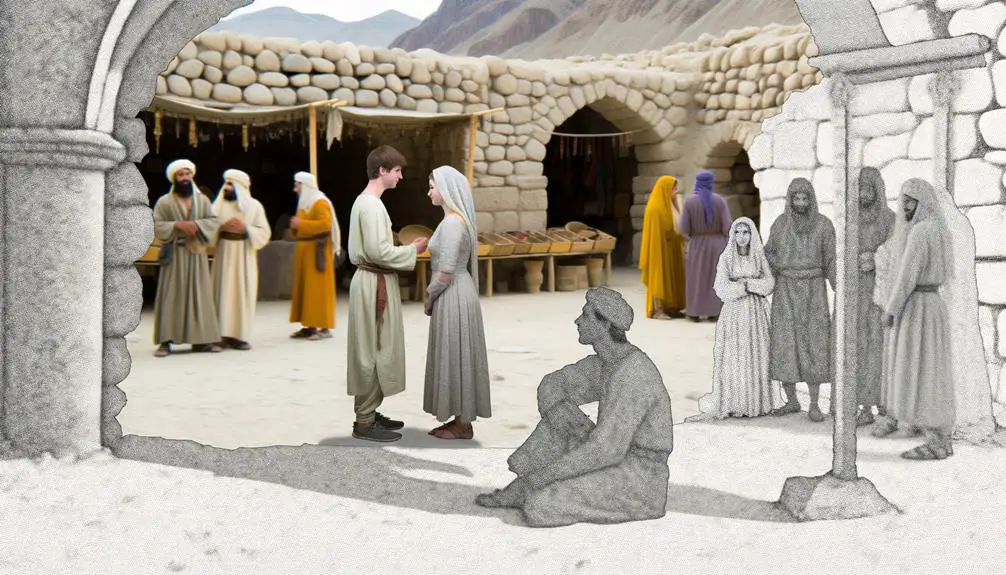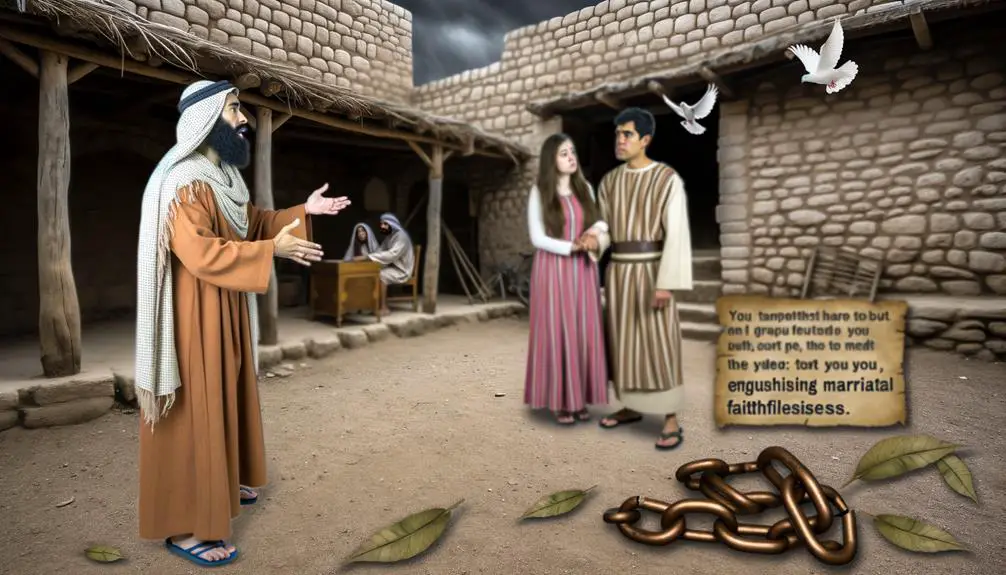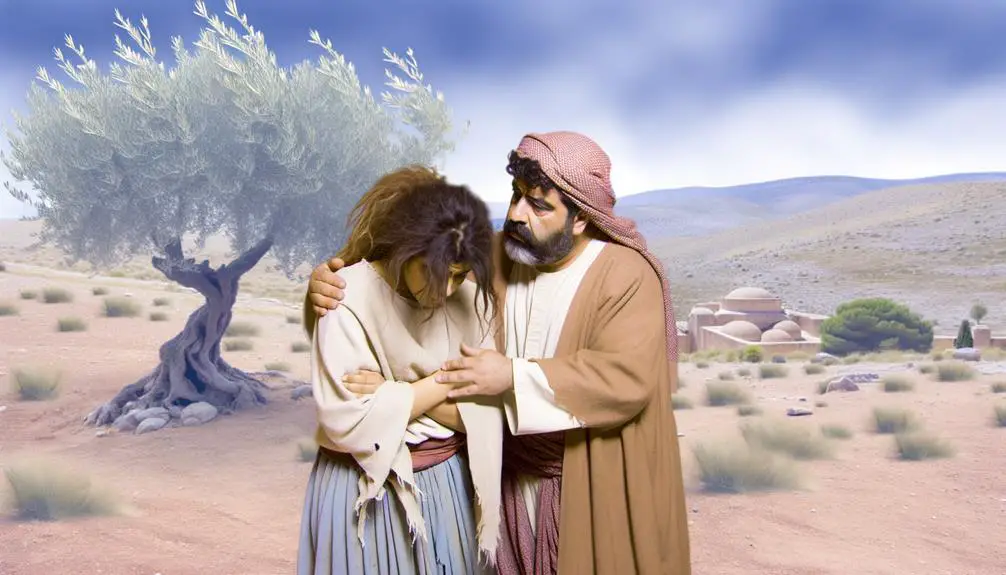Yielding profound lessons on fidelity, the Bible's tales of cheating husbands reveal the dire consequences of betrayal—discover what happens next.

Cheating Husband in the Bible
In the Bible, a cheating husband isn't just a breach of trust; it's a moral cataclysm that defeats the sanctity of marriage. Consider King David and Bathsheba, for instance, where adultery leads to deceit and calamity. The Bible treats such infidelity seriously, underscoring loyalty and integrity within marriage as divine commandments. Prophets warn of the dire consequences, both spiritually and socially, that ripple through families and communities. Hosea's narrative with Gomer similarly exploits the pain of betrayal, yet also showcases the possibility of forgiveness. These stories reflect deeper lessons on fidelity and the complexities of human relationships, offering insights that extend beyond the ancient texts.
Key Takeaways
- King David committed adultery with Bathsheba, leading to severe personal and national consequences.
- The Bible condemns adultery, highlighting its breach of marital and divine trust.
- Prophetic teachings advocate for marital fidelity, emphasizing it as a covenantal and moral imperative.
- Adultery disrupts community harmony and can lead to legal and social repercussions.
- Stories like that of Hosea and Gomer use marital infidelity as allegories for spiritual unfaithfulness to God.
Biblical Definition of Adultery

In analyzing the Biblical context, adultery is defined as the act of a married individual engaging in sexual relations with someone who is not their spouse. This breach of marital boundaries isn't just a betrayal of trust; it's seen as a profound moral failing that disrupts the spiritual and communal harmony.
As you dive deeper, you'll recognize that the Bible doesn't merely recount tales of sin; it also provides insights into human behavior and relationships. Infidelity triggers, for instance, are often rooted in deeper emotional or spiritual voids. The scriptures suggest that adultery goes beyond physical acts, pointing to the lustful intentions in one's heart as equally culpable.
Respect for marital vows is heavily emphasized, and the consequences of violating these sacred boundaries are severe, impacting all involved parties. The narrative isn't just about condemnation but also serves as a precautionary tale to guard against temptations that threaten marital fidelity.
Understanding these dynamics can help you appreciate the protective intent behind these biblical mandates. They aren't merely rules but are designed to foster trust, respect, and love within the marital relationship, ensuring that the union remains a source of mutual support and spiritual growth.
Case Study: King David and Bathsheba
As you explore the case of King David and Bathsheba, consider the profound moral implications that emerge from this narrative. The consequences David faced not only affected his personal life but also had far-reaching impacts on his reign and his family. Reflecting on this story can offer you deep insights into the complexities of moral failings and the ripple effects they generate.
Moral Implications Explored
Exploring the moral implications of King David's affair with Bathsheba reveals how even revered leaders can succumb to personal failings. You're faced with a scenario where societal norms are disrupted, and personal accountability becomes vital. As you investigate further, consider how David, anointed as a man after God's own heart, grapples with the temptations that lead him astray. This narrative isn't just ancient history; it's a mirror reflecting how power and responsibility are often at odds.
Your takeaway? Understand that your actions resonate beyond personal consequences, influencing those around you and the fabric of your community. It's a potent reminder that no one is immune to ethical lapses, and continuous self-reflection and adherence to moral codes are essential.
Consequences for David
Reflecting on David's moral failures, let's now examine the severe repercussions he faced following his affair with Bathsheba. The consequences extended beyond personal guilt; they had profound implications on his kingdom and his family. David's remorse was palpable—he mourned deeply, recognizing his sin against God and the harm he inflicted on those around him, including Uriah's tragic fate. Orchestrating Uriah's death to conceal his wrongdoing, David's actions set a cascade of divine judgment in motion. This ultimately led to turmoil within his own household and challenges to his authority. Analyzing this episode, you see a clear warning: unchecked desires and unethical decisions can unravel even the most revered leaders' lives, leaving a legacy tainted by those choices.
The Prophets on Marital Faithfulness

Many prophets in the Bible sternly warn against marital infidelity, emphasizing its consequences not only for individuals but also for the community. Their voices echo through the ages, reminding you that marital loyalty is not just a private affair but a covenant that upholds the social fabric.
Prophet warnings about marital loyalty are profound. For instance, Hosea uses his own marriage to depict Israel's unfaithfulness to God, illustrating how personal betrayal can mirror a community's spiritual adultery. His life becomes a poignant narrative that underscores the sacredness of the marriage vow. Similarly, Malachi rebukes the people for being unfaithful to the wives of their youth. His admonition, 'So guard yourself in your spirit, and do not be faithless,' resonates as a call to personal integrity and communal responsibility.
These prophetic insights urge you to contemplate how your actions within the confines of marriage reflect broader societal values. They advocate for a commitment that transcends personal gratification, aligning with divine expectations and societal welfare. Reflecting on these teachings, you're invited to view marriage as a cornerstone of both personal and communal health, a sacred trust that, when honored, fosters stability and prosperity across communities.
Consequences of Adultery in Law
Throughout history, laws have starkly outlined the severe consequences of adultery, impacting not just the individuals involved but also their broader community. When you step over the line and commit adultery, you're not only breaking a personal trust, but you're also potentially exposing yourself to significant legal consequences and harsh societal judgments.
In many places, the legal system can impose penalties that might affect your marital status, your financial stability, and even your parental rights. It's not just about the moral or emotional implications; it's about tangible, life-altering legal consequences. Here's what you might face:
- Loss of Custody: Courts often consider the moral conduct of parents in custody disputes. Adultery can weigh heavily against you, potentially resulting in a loss of custody or reduced visitation rights with your children.
- Financial Penalties: You might find yourself financially strained due to alimony adjustments or even lawsuits for alienation of affection in some jurisdictions.
- Social Stigma: Beyond the courtroom, the court of public opinion can be unforgiving. You might experience isolation or ostracization by friends, family, and community, impacting your social and professional life severely.
Understanding these outcomes can guide you to weigh the full scope of committing adultery, not just the immediate gratification but the enduring repercussions that ripple through all aspects of your life.
Hosea and Gomer's Story

In the biblical narrative, Hosea's marriage to Gomer serves as a profound allegory for Israel's infidelity to God, illustrating the personal and spiritual ramifications of betrayal. This story isn't just a tale from the past; it's a deeply symbolic exploration of covenant relationships and divine expectations. Hosea, a prophet, receives God's command to marry Gomer, a woman described as prone to adultery. This union, right from its inception, is imbued with divine symbolism; it mirrors the relationship between a faithful God and an unfaithful nation.
As you explore further into their story, you'll see that Gomer's repeated infidelities and eventual departure from Hosea symbolize Israel's own spiritual adultery—its turning away from God to worship idols. The prophetic allegory here is rich with implications. It's not just about the pain of a cheated spouse; it's about the heartbreak of God as His people break their sacred vows.
Yet, the story doesn't end with despair. Hosea's eventual redemption of Gomer, buying her back from slavery, underscores a powerful message of forgiveness and restoration. It reflects God's unwavering commitment to His people, despite their failings. This narrative invites you to reflect on the depths of God's grace and the profound consequences of spiritual waywardness.
Jesus and the Adulterous Woman
In the story of Jesus and the adulterous woman, you see a profound display of mercy over condemnation. This narrative not only showcases the compassionate ethos of Jesus's teachings but also invites you to contemplate the cultural context of that era. Understanding these elements can deepen your appreciation of how revolutionary Jesus's actions were in a society that strictly enforced marital fidelity.
Mercy Over Condemnation
Often, you'll find that Jesus demonstrated a profound preference for mercy over condemnation, as vividly depicted in the story of the adulterous woman. This narrative not only highlights His divine compassion but also showcases His forgiving nature in the face of blatant sin.
- Empathy: Imagine the depth of fear and shame the woman must have felt, surrounded by accusers, yet Jesus responded not with stones but with understanding.
- Transformation: Reflect on how a single act of kindness could transform a person's entire life trajectory.
- Reflection: Consider how often you've yearned for a second chance when mistakes were made.
Jesus' response is a powerful reminder of the potential of mercy to triumph over judgment.
Cultural Context Explored
To fully grasp the story of Jesus and the adulterous woman, it's important to understand the historical and cultural backdrop of that era. Gender roles and societal norms heavily influenced how this event was perceived and recorded. Women were often subject to harsher scrutiny and punishment for moral failures, while men's roles allowed more leeway in their actions.
Aspect |
Description |
Impact on Story |
|---|---|---|
Gender Roles |
Women had limited rights and status |
Highlighted disparity |
Societal Norms |
Adultery viewed as severe sin |
Intensified the accusation |
Legal System |
Law favored men in adultery cases |
Uneven power dynamics |
Religious Influence |
Strong, with strict moral expectations |
Framed the forgiveness |
Public Perception |
Community judgment was harsh |
Added pressure on Jesus |
This scenario showcases Jesus challenging these norms, promoting a message of mercy over condemnation.
Parables Reflecting Infidelity

Several parables in the Bible subtly mirror themes of infidelity, offering you insights into its moral and spiritual ramifications. When examining these parables, you're invited to reflect not just on the act of betrayal, but also on the deeper symbolism it carries. The parable of the Prodigal Son, for instance, can be viewed through the lens of 'Infidelity symbolism'. Here, the prodigal's departure and subsequent return echo the themes of betrayal and forgiveness, not unlike what one might experience in a marital infidelity scenario.
Similarly, 'Prodigal comparisons' allow you to see how the faithful and unfaithful are portrayed in these stories. The contrast between the faithful older brother and the wayward younger brother mirrors the emotional and moral distances that infidelity can create within relationships.
To deepen your understanding, consider these aspects:
- Emotional Resonance: The heartache of the forgiving father reflects the pain of those betrayed.
- Moral Dilemma: The older brother's struggle with forgiveness highlights the complexity of feelings in those affected by infidelity.
- Spiritual Reflection: The reconciliation offers a moment of profound spiritual introspection and hope for renewal.
These narratives serve as more than just cautionary tales; they are a profound exploration of human frailty and the possibility of redemption.
Adultery in the Wisdom Literature
Adultery is frequently addressed with stark warnings and profound wisdom in the books of Proverbs and Ecclesiastes, advising one to contemplate the severe moral and spiritual consequences of such actions. As you explore the wisdom literature, you'll find that Solomon's warnings are particularly poignant, offering Proverbial guidance that resonates through the ages.
Solomon, in his sagacity, doesn't merely admonish but elucidates the pitfalls of adultery, weaving his life experiences with universal truths. These texts serve as a mirror, urging you to reflect on the broader implications of your choices.
Proverbs/Ecclesiastes |
Quote |
Insight |
|---|---|---|
Proverbs 5:3-5 |
'For the lips of an adulterous woman drip honey, and her speech is smoother than oil; but in the end she is bitter as gall, sharp as a double-edged sword.' |
Highlights the initial sweetness and ultimate bitterness of illicit relationships. |
Proverbs 6:32 |
'But a man who commits adultery has no sense; whoever does so destroys himself.' |
Stresses self-destruction as an inevitable consequence of adultery. |
Ecclesiastes 7:26 |
'And I find more bitter than death the woman whose heart is snares and nets, and her hands as bands…' |
Warns against the entrapment that often accompanies adulterous liaisons. |
Proverbs 5:8 |
'Keep to a path far from her, do not go near the door of her house…' |
Advises avoidance as the best strategy against temptation. |
Proverbs 6:29 |
'So is he who sleeps with another man's wife; no one who touches her will go unpunished.' |
Reminds of the inevitable justice that befalls the adulterer. |
This table encapsulates the essence of Solomon's admonishments and the Proverbial guidance provided to steer clear of adultery's destructive path. Reflect on these insights and consider the profound impact of your moral choices.
Repentance and Forgiveness Examples

While the Wisdom Literature provides stark warnings against adultery, it also opens the door to exploring how biblical narratives address the potential for repentance and forgiveness after such transgressions. You can see throughout scripture that forgiveness is not only a possibility but a divine expectation. The pathway to restoration, however, often requires genuine repentance steps and involves specific forgiveness rituals that are both personal and communal.
Consider these examples to understand the emotional depth and the gravity of seeking forgiveness:
- King David's profound sorrow and repentance after his affair with Bathsheba, which is poignantly captured in Psalm 51. Here, he begs for cleansing and renewal of spirit, showcasing a heartfelt return to God.
- The Prodigal Son's return in the New Covenant, where his repentance is met with an outpouring of his father's unconditional love and forgiveness, illustrating that true repentance can restore broken relationships.
- Hosea's forgiveness of Gomer, despite her repeated unfaithfulness, symbolizes God's unwavering love and readiness to forgive Israel, encouraging you to embrace forgiveness as a divine attribute.
In each narrative, the steps toward repentance and the rituals of forgiveness are clear. They teach you that reconciliation is achievable, and they underscore the transformative power of forgiveness.
Modern Reflections on Biblical Infidelity
As you reflect on the stories of infidelity from the Bible, consider how these narratives offer moral lessons that are still relevant today. You'll find that analyzing the cultural impact of these stories can reveal how societal norms and values around fidelity have evolved. Finally, exploring ethical perspectives will help you understand the complexities of moral judgment in both ancient and modern contexts.
Moral Lessons Today
Reflecting on biblical stories of infidelity, you can discern timeless lessons about trust, commitment, and the consequences of betrayal in relationships. These narratives not only mirror the complexities of relationship dynamics but also challenge societal norms, urging a reflection on personal and communal values.
- Trust Broken: The deep emotional impact when trust is shattered in a marriage.
- Commitment Tested: How challenges to fidelity can either weaken or, conversely, strengthen a bond, depending on the responses of those involved.
- Consequences Felt: The ripple effects of infidelity, affecting families and communities beyond just the couple.
These stories serve as a mirror, showing you the importance of integrity and the often painful outcomes of forsaking it. Analyzing these tales helps you understand the critical role of fidelity in securing the fabric of relationships.
Cultural Impact Analysis
You'll find that the echoes of biblical stories of infidelity resonate deeply within modern cultural contexts, influencing everything from literature to relationship counseling. These narratives challenge and reflect the shifting social norms surrounding fidelity and the ethical dilemmas they engender. As you analyze these stories, you'll see how they've been used to critique or reinforce societal values. This reflection helps individuals navigate their personal relationships in light of broader cultural expectations. Additionally, discussions around these ancient texts provide a framework through which modern dilemmas around loyalty and betrayal can be examined. By engaging with these stories, you gain insights into how cultures reconcile the complex interplay of personal ethics with communal standards.
Ethical Perspectives Explored
When examining modern reflections on biblical infidelity, it is crucial to contemplate how these ancient narratives shape our understanding of ethical behavior in contemporary society. The stories not only reflect historical contexts but also touch upon enduring ethical dilemmas that challenge our modern views on fidelity and marital expectations.
- Disappointment and Betrayal: How would you feel if the trust you placed in your partner was shattered?
- Moral Confusion: Can the lines between right and wrong become blurred when faced with the complexities of human relationships?
- Search for Redemption: Is there room for forgiveness and healing after such profound betrayal?
These reflections offer a deeper insight into the struggles individuals face, urging you to reflect on the broader implications of these ethical challenges in your own life.
Frequently Asked Questions
How Did Early Christian Communities Handle Accusations of Infidelity?
In early Christian communities, accusations of infidelity were addressed through church discipline, ensuring a thoughtful community response. You'd find leaders often mediated, aiming to restore relationships and uphold moral integrity within the group.
Are There Specific Prayers for Healing a Marriage After Infidelity?
You might find forgiveness prayers helpful for healing and spiritual restoration in your marriage after infidelity. These prayers can facilitate deeper understanding and reconciliation, allowing both partners to move forward with renewed commitment.
What Role Do Pastors or Priests Play in Counseling Infidelity?
Pastors or priests offer spiritual guidance, addressing ethical dilemmas in counseling infidelity. They provide a compassionate space for both partners to explore healing, emphasizing forgiveness and understanding from a moral and spiritual perspective.
How Can Couples Rebuild Trust After an Incident of Infidelity?
To rebuild trust after infidelity, you'll need to engage in forgiveness practices and develop robust communication strategies. It's essential to understand each other's feelings and commit to transparency in your future interactions.
What Support Groups Exist for Christians Dealing With Marital Infidelity?
Sailing through the stormy seas of marital infidelity, you'll find solace in church-based support groups. These groups foster emotional resilience, guided by church policies, offering a compassionate framework for healing and understanding.


Sign up